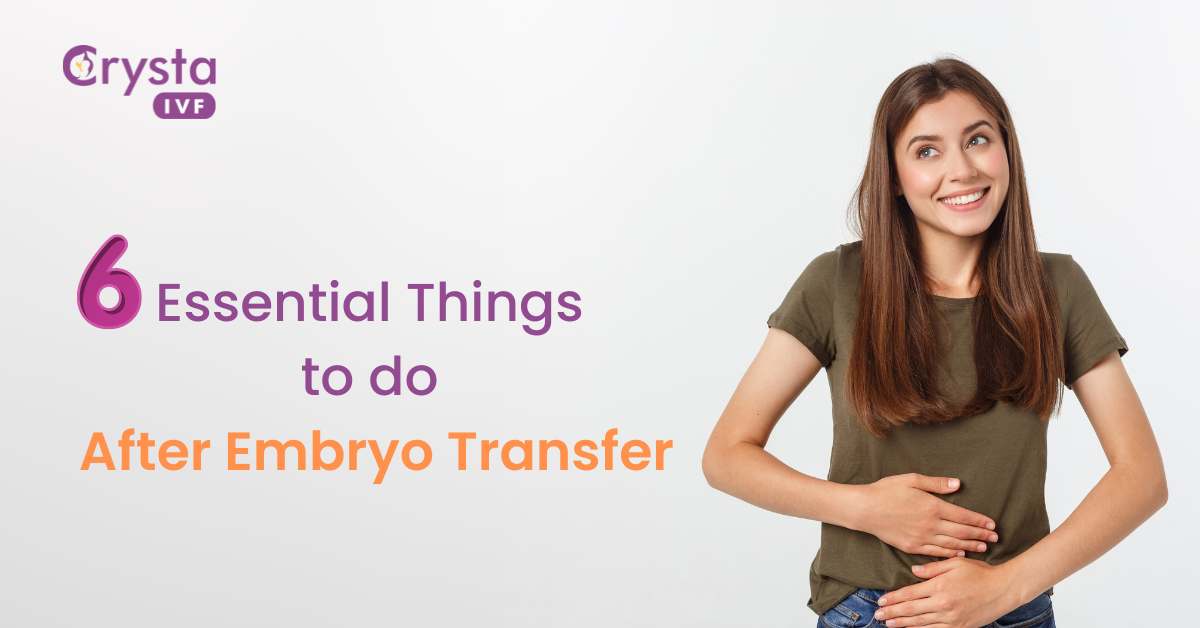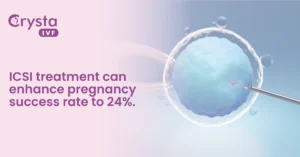So you’ve reached the final stage of the In Vitro Fertilization (IVF) Process. The day of embryo transfer feels like the day you have been waiting for so long. Completing an IVF cycle is like a dream come true for many couples who have been struggling with infertility.
It can be a long and arduous process, but the reward of finally having a baby is worth all the hard work.
But since you’re at the highest points in the IVF process, the wait for a pregnancy test feels like you’re on pins and needles. The day after the embryo transfer, you may be wondering “Now What?”What should you do or should you avoid doing?
However, the precaution you take has little to do with the pregnancy’s success after an embryo transfer. But still, there are a few things to consider that may help you achieve a healthy baby or successful IVF outcomes.
Let’s understand all about embryo transfer in IVF and what you need to do till pregnancy.
What Is IVF & Why Is It Done?
- In-vitro fertilization (IVF) is a medical procedure used to help couples that are struggling with infertility.
- A woman’s eggs are surgically removed from her ovaries and fertilized by a man’s sperm in a laboratory.
- The fertilized eggs are then transferred back into the woman’s uterus in the hopes that they will implant and develop into a healthy pregnancy.
- IVF is often seen as a last resort when other fertility treatments have failed, as it has a higher success rate than many other options.
- IVF can also be used in cases where a woman has difficulty producing eggs or when a man has difficulty producing sperm.
- It is also sometimes used to prevent the transmission of genetic diseases from one generation to the next.
- Ultimately, IVF is a tool that helps many couples who are struggling with infertility achieve their dream of having a family.
Before You Opt for IVF Treatment
The first step is to consult with a fertility specialist at Crysat IVF, who can provide an overview of the IVF procedure and help you decide if it is the right choice for you.
Once the decision is made to proceed, the next step is to prepare for the cycle, including undergoing medical tests and discussing medications with your doctor. During the actual process, you’ll need to remain patient and positive as you wait for results.
The cycle can be emotionally and physically draining, but when the results come back positive, and you hear that your baby is on the way, it will be one of the most joyous moments of your life.
And so, you must take all possible precautionary measures to ensure a healthy pregnancy and a healthy you.
Things You Should Do Post Embryo Transfer
After undergoing an embryo transfer in In Vitro Fertilization (IVF), there are a few important things to do that can help increase your chances of a successful pregnancy.
1. Take plenty of rest
First, you should get plenty of rest for at least a few days. This will give your body the time it needs to adjust to the embryo transfer and reduce your chances of experiencing cramping or pain. Rest and relax as much as possible. Take a nap or read a book to take your mind off the procedure.
2. Drink up & stay hydrated
Drink plenty of water and herbal teas to keep your body functioning properly. It is found that fluid improves the functioning of endometrial cells and thus improves the chances of IVF success.
3. Keep taking prescribed medications
We understand you may be frustrated & annoyed with all those injections and drugs during the process, but you should not avoid taking them without talking to your doctor first. For some women, it is recommended to keep taking progesterone post-embryo transfer for a few weeks to give pregnancy the best chance to continue.
So yes, if you’re still taking medications daily, know it is all for a good reason.
4. Listen to your body
It becomes essential to give your body the best chance to conceive; after all, you’ve waited for this moment for ages. Pay attention to any signs of discomfort or change in symptoms and contact your doctor if necessary.
5. Add folic acid supplements to your diet
Folic acid supplements support fertility health, and pregnancy. A study found that folic acid is also associated with a lower risk of congenital heart defects in babies. So, if you aren’t already adding folic acid supplements, it’s time to start eating healthy foods high in Folate (folic acid), including legumes, leafy greens, brussels sprouts, nuts, seeds, and broccoli.
6. Changing your habits for better health
It is important to maintain a healthy lifestyle, eat a balanced diet, avoid stress, and exercise regularly. Doing so can help to ensure that your body is in the best possible condition for supporting a successful pregnancy.
Here is an experienced IVF specialist, Dr. Ruchita Sharma from Crysta IVF who is talking in detail about the precautions after embryo transfer.
Visit the link: https://www.youtube.com/watch?v=5uv5xh0vAuY&t=177s
Things You Should Avoid Post Embryo Transfer
An embryo transfer is an important step in the IVF journey. Once the embryos are placed in the uterus, it’s essential to take extra care of your body to give them the best chance of implanting and growing into healthy babies.
Here are some things to avoid post-embryo transfer:
1. Avoid strenuous physical activity
You should also avoid lifting heavy objects or engaging in activities involving bouncing or jarring motions. Your doctor may recommend avoiding exercising or lifting heavy objects for a few days.
2. Avoid any sexual activity
Avoid sexual intercourse for at least a few days after the transfer. This ensures that the uterus is not disturbed, which could potentially jeopardize the pregnancy.
3. Avoid hot baths and saunas
You should avoid taking long baths, hot tubs, or swimming in pools or hot springs, as they can raise your body temperature and disrupt the embryo’s development.
4. Stop smoking or excessive alcohol consumption
Additionally, avoid smoking, drinking alcohol, and using any drugs (including recreational drugs) during this time, as they can affect your hormones and reduce your chances of success.
5. Relieve stress and anxiety
It is essential to avoid any stressful situations or environments. This includes avoiding anything that could potentially cause emotional or mental stress, such as arguments with family or friends.
After months or even years of trying to conceive naturally, IVF can provide the answer they have been searching for. If you’re the one who is just starting out with the treatment, you must know these essential tips for a successful IVF treatment.
Also read: Tips for Successful IVF Treatment & Frozen Embryo Transfer
Despite the physical and emotional challenges of the process, the joy that comes with a successful outcome can be life-changing. For those who have been struggling to conceive, the promise of a healthy baby is one of the greatest gifts.
It’s a reminder that even after the most difficult of journeys, anything is possible.
For couples who have gone through the IVF process, success is truly the sweetest reward. And we at Crysta IVF truly hope you’ll take time to rest and care for yourself and ensure that you are in the best possible state for the embryo transfer to be successful.




